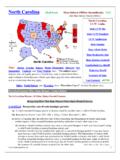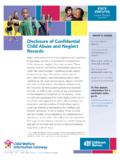Transcription of CODE OF ETHICS FOR NORTH CAROLINA EDUCATORS
1 CODE OF ETHICS FOR NORTH CAROLINA EDUCATORS Adopted by the State Board of Education June 5, 1997 PREAMBLE The purpose of this Code of ETHICS is to define standards of professional conduct. The responsibility to teach and the freedom to learn, and the guarantee of equal opportunity for all are essential to the achievement of these principles. The professional educator acknowledges the worth and dignity of every person and demonstrates the pursuit of truth and devotion to excellence, acquires knowledge, and nurtures democratic citizenship. The educator strives to maintain the respect and confidence of colleagues, students, parents and legal guardians, and the community, and to serve as an appropriate role model.
2 The educator exemplifies a commitment to the teaching and learning processes with accountability to the students, maintains professional growth, exercises professional judgment, and personifies integrity. To uphold these commitments, the educator: I. COMMITMENT TO THE STUDENT A. Protects students from conditions within the educator s control that circumvent learning or are detrimental to the health and safety of students. B. Maintains an appropriate relationship with students in all settings; does not encourage, solicit, or engage in a sexual or romantic relationship with students, nor touch a student in an inappropriate way for personal gratification, with intent to harm, or out of anger.
3 C. Evaluates students and assigns grades based upon the students demonstrated competencies and performance. D. Disciplines students justly and fairly and does not deliberately embarrass or humiliate them. E. Holds in confidence information learned in professional practice except for professional reasons or in compliance with pertinent regulations or statutes. F. Refuses to accept significant gifts, favors, or additional compensation that might influence or appear to influence professional decisions or actions. II. COMMITMENT TO THE SCHOOL AND SCHOOL SYSTEM A. Utilizes available resources to provide a classroom climate conducive to learning and to promote learning to the maximum possible extent.
4 B. Acknowledges the diverse views of students, parents and legal guardians, and colleagues as they work collaboratively to shape educational goals, policies, and decisions; does not proselytize for personal viewpoints that are outside the scope of professional practice. C. Signs a contract in good faith and does not abandon contracted professional duties without a substantive reason. D. Participates actively in professional decision-making process and supports the expression of professional opinions and judgments by colleagues in decisionmaking processes or due process proceedings. E. When acting in an administrative capacity: 1. Acts fairly, consistently, and prudently in the exercise of authority with colleagues, subordinates, students, and parents and legal guardians.
5 2. Evaluates the work of other EDUCATORS using appropriate procedures and established statutes and regulations. 3. Protects the rights of others in the educational setting, and does not retaliate, coerce, or intentionally intimidate others in the exercise of rights protected by law. 4. Recommends persons for employment, promotion, or transfer according to their professional qualifications, the needs and policies of the LEA, and according to the law. III. COMMITMENT TO THE PROFESSION A. Provides accurate credentials and information regarding licensure or employment and does not knowingly assist others in providing untruthful information. B. Takes action to remedy an observed violation of the Code of ETHICS for NORTH CAROLINA EDUCATORS and promotes understanding of the principles of professional ETHICS .
6 C. Pursues growth and development in the practice of the profession and uses that knowledge in improving the educational opportunities, experiences, and performance of students and colleagues. CODE OF PROFESSIONAL PRACTICE AND CONDUCT FOR NORTH CAROLINA EDUCATORS The NORTH CAROLINA State Board of Education (SBE) has adopted rules to establish uniform standards of professional conduct for licensed professional EDUCATORS throughout the state. These rules have been incorporated into Title 16 of the NORTH CAROLINA Administrative Code and have the effect of law. These rules shall be the basis for State Board of Education review of performance of professional EDUCATORS and are binding on every person licensed by the State Board of Education.
7 Violation of the standards shall subject an educator to investigation and possible disciplinary action by the State Board of Education or local school district. SECTION .0600 - CODE OF PROFESSIONAL PRACTICE AND CONDUCT FOR NORTH CAROLINA EDUCATORS 16 NCAC - THE PURPOSE AND APPLICABILITY OF THE RULES OF PROFESSIONAL CONDUCT FOR EDUCATORS The purpose of these rules is to establish and uphold uniform standards of professional conduct for licensed professional EDUCATORS throughout the State. These rules shall be binding on every person licensed by the SBE, hereinafter referred to as educator or professional educator, and the possible consequences of any willful breach shall include license suspension or revocation.
8 The prohibition of certain conduct in these rules shall not be interpreted as approval of conduct not specifically cited. History Note: Authority ; Eff. April 1, 1998. 16 NCAC - THE STANDARDS OF PROFESSIONAL CONDUCT FOR NC EDUCATORS (a) The standards listed in this Section shall be generally accepted for the education profession and shall be the basis for State Board review of performance of professional EDUCATORS . These standards shall establish mandatory prohibitions and requirements for EDUCATORS . Violation of these standards shall subject an educator to investigation and disciplinary action by the SBE or LEA. (b) Professional EDUCATORS shall adhere to the standards of professional conduct contained in this Rule.
9 Any intentional act or omission that violates these standards is prohibited. (1) Generally recognized professional standards. The educator shall practice the professional standards of federal, state, and local governing bodies. (2) Personal conduct. The educator shall serve as a positive role model for students, parents, and the community. Because the educator is entrusted with the care and education of small children and adolescents, the educator shall demonstrate a high standard of personal character and conduct. (3) Honesty. The educator shall not engage in conduct involving dishonesty, fraud, deceit, or misrepresentation in the performance of professional duties including the following: A.
10 Statement of professional qualifications; B. application or recommendation for professional employment, promotion, or licensure; C. application or recommendation for college or university admission, scholarship, grant, academic award, or similar benefit; D. representation of completion of college or staff development credit; E. evaluation or grading of students or personnel; F. submission of financial or program compliance reports submitted to state, federal, or other governmental agencies; G. submission of information in the course of an official inquiry by the employing LEA or the SBE related to facts of unprofessional conduct, provided, however, that an educator shall be given adequate notice of the allegations and may be represented by legal counsel; and H.








